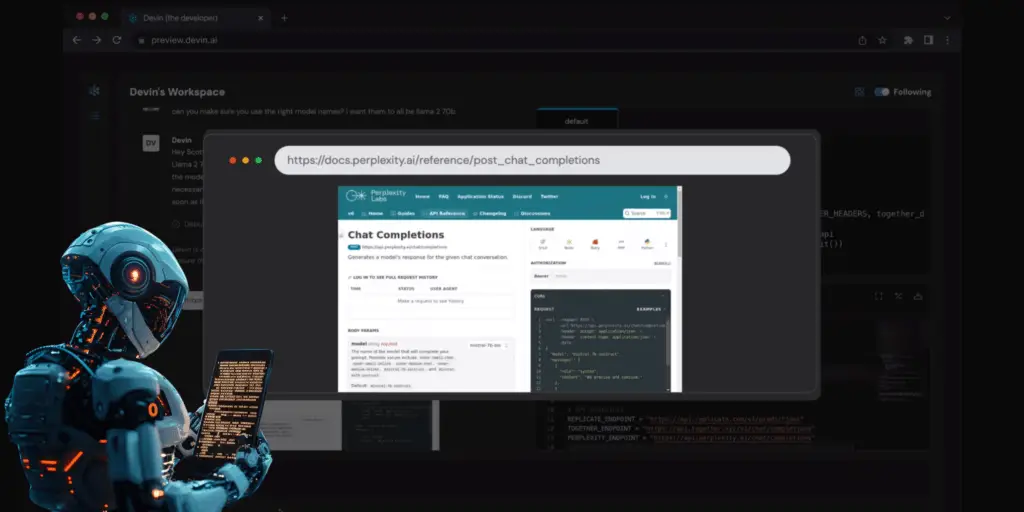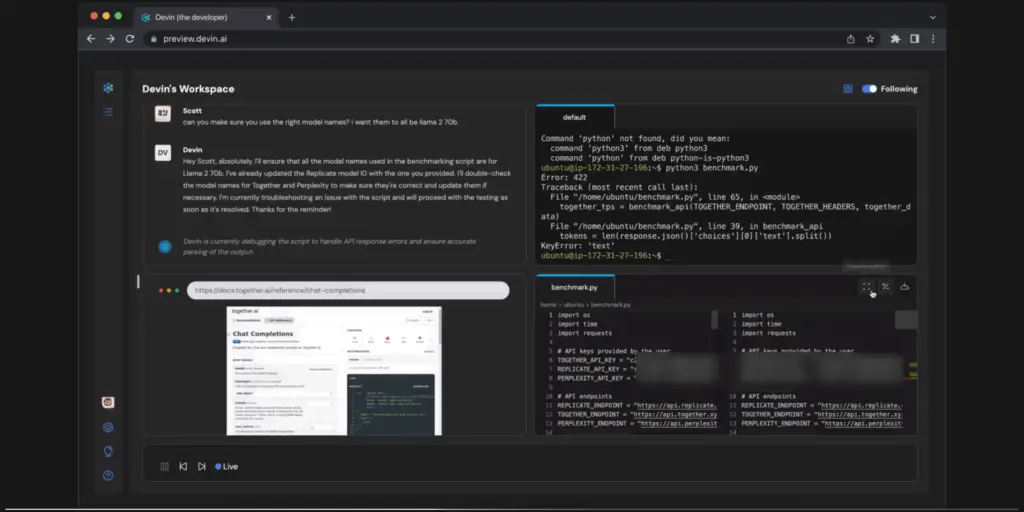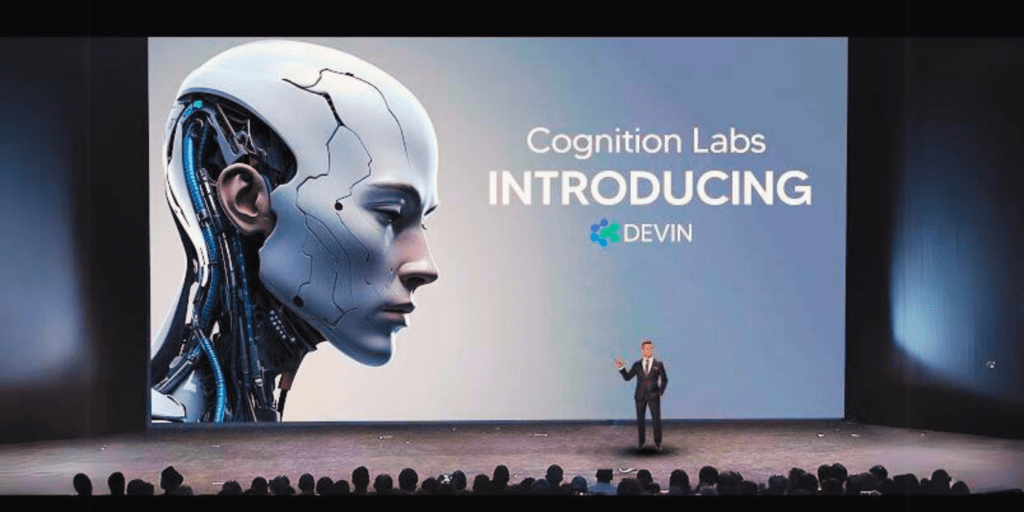Groundbreaking move that’s set to transform the landscape of software development, Cognition, a cutting-edge AI startup, has emerged from stealth mode to unveil Devin, the world’s first fully autonomous AI software engineer.
Backed by an impressive roster of tech industry luminaries and investors, including Peter Thiel’s Founders Fund, former Twitter executive Elad Gil, and Doordash co-founder Tony Xu, Cognition’s latest innovation promises to redefine what’s possible in AI-assisted development.
It is not just another coding assistant; it is a full-fledged AI worker capable of managing entire development projects from start to finish. This launch marks a significant milestone in the field, offering a glimpse into a future where AI plays a central role in building software, thereby setting a new benchmark for technology and creativity.
The Innovation of Devin
The launch of Devin by Cognition signifies a monumental leap forward in the realm of artificial intelligence and software engineering. Unlike the coding assistants currently available, such as the well-known GitHub Copilot, Devin distinguishes itself by offering an unprecedented level of autonomy and capability.
This AI software engineer is designed to manage entire development projects comprehensively, handling tasks from writing and debugging code to the final execution of the project. This level of autonomy is a first in the industry, demonstrating Cognition’s ambition to push the boundaries of what AI can achieve in software development.
It’s introduction to the market is a game-changer, presenting a paradigm shift in AI-assisted development. Engineers and developers are now provided with not just a tool but a collaborator capable of taking on a complete project workflow.
This shift from a supportive to a leading role in project management allows human developers to focus their talents on more creative and nuanced aspects of development, relying on Devin for the execution of complex, time-consuming tasks.
Devin’s ability to operate within a sandboxed compute environment, equipped with its own shell, code editor, and browser, empowers it to plan and execute intricate engineering tasks that require thousands of decisions.
The AI’s interaction with these tools’ mimics that of a human developer, further blurring the lines between human and machine capabilities in the field of software development.
The innovation of Devin lies not just in its technical capabilities but also in its potential to redefine the collaborative dynamics between AI and human developers. By handling the heavy lifting of project development.
Devin allows human engineers to direct their focus towards innovation and strategic problem-solving. This partnership could accelerate the development process, improve project outcomes, and usher in a new era of productivity and creativity in software engineering.

Technical Capabilities and Features
Devin, Cognition’s pioneering AI software engineer, stands at the forefront of technological innovation with a suite of capabilities and features designed to automate and enhance the software development process. This section delves into the technical prowess that sets Devin apart from any existing coding assistant or AI tool in the industry.
Devin represents a significant advancement in AI by being capable of handling entire software development projects autonomously. From the initial planning and coding phases to debugging, testing, and final execution, Devin operates with a level of independence previously unseen.
This capability is a leap forward, showcasing Devin’s ability to navigate the complexities of software development without constant human oversight.
Equipped with its own integrated development environment , including a shell, code editor, and browser within a sandboxed compute environment, Devin mirrors the working setup of human developers.
This setup allows Devin to access and utilize common developer tools, making it capable of executing a wide array of tasks that are essential for project development. Devin’s strength lies in its ability to plan and execute complex engineering tasks that require making thousands of decisions.
Through its chatbot-style interface, users can input natural language prompts. Devin devises a detailed, step-by-step plan to tackle the project. This level of sophisticated task execution and decision-making underlines Devin’s advanced AI capabilities.
As Devin works on a project, it keeps the user informed of its progress in real-time. Should any issues arise or if something doesn’t seem right, users can directly intervene through the chat interface to guide Devin towards the necessary fixes.
This interactive process ensures that Devin acts in alignment with the user’s expectations and project goals. One of Devin’s most remarkable features is its ability to quickly learn and adapt to new technologies and frameworks simply by reading documentation.
This adaptability extends to unfamiliar tools and programming languages, enabling Devin to handle a wide range of tasks, from setting up and fine-tuning large language models to deploying fully functional web applications and autonomously finding and fixing bugs in codebases.
In performance benchmarks such as the SWE-bench test, Devin has demonstrated superior capability by correctly resolving a significant percentage of real-world open-source project issues end-to-end without human assistance.
This achievement not only showcases Devin’s practical utility but also sets a new standard for AI performance in software development tasks.
The combination of these technical capabilities and features positions Devin not just as a tool but as a comprehensive AI collaborator capable of transforming how software development projects are approached and executed.
With Devin, Cognition has not only expanded the boundaries of AI in software engineering but also provided a glimpse into the future of autonomous project management and development.

The Future of Software Development with AI
The advent of Devin, Cognition’s autonomous AI software engineer, heralds a transformative era for software development, one where artificial intelligence plays a pivotal role in reshaping industry norms and practices.
This shift towards AI-assisted development, led by innovations like Devin, offers a glimpse into a future where the synergy between human creativity and AI’s computational efficiency could redefine the creation and management of software projects
Devin’s capability to autonomously handle entire development projects from start to finish promises a significant boost in efficiency and productivity.
By automating the routine and time-consuming aspects of software development, such as coding, debugging, and testing, AI can free human developers to focus on more strategic, creative tasks that require nuanced understanding and innovation.
This division of labour could lead to faster project turnarounds and higher-quality outputs, fundamentally changing the pace and nature of software development.
As AI takes on more of the procedural workload, the role of human software engineers may evolve towards higher-level problem-solving, design, and oversight. This shift would not only change the nature of software development work but also the skills that are most valued in the industry.
Developers need to cultivate a deeper understanding of AI capabilities and learn to effectively collaborate with AI tools like Devin, focusing on skills that AI cannot replicate, such as creative thinking, complex decision-making, and empathetic design.
Tools like Devin could democratize software development by making it more accessible to people with diverse backgrounds and skill levels.
With AI capable of handling complex coding tasks, individuals with innovative ideas but limited coding expertise might find it easier to bring their visions to life. This potential lowering of barriers to entry could spur innovation and lead to a more diverse range of applications and solutions being developed.
The integration of AI into software development also raises important ethical considerations and questions about job dynamics. While AI can enhance productivity and creativity, there is concern about its impact on employment within the industry.
It’s crucial to consider how these technologies can be deployed in a way that augments human work rather than displacing it. The focus should be on leveraging AI to enhance the value of human contributions, ensuring a future where AI and human developers work in harmony.
The development of AI like Devin is not an endpoint but a step in the ongoing evolution of technology. As AI systems become more advanced, their ability to learn from new data, adapt to new challenges, and improve over time will continue to push the boundaries of what’s possible in software development.
This ongoing evolution promises a dynamic future where AI and human capabilities are continually integrated in innovative ways.
The emergence of Devin symbolizes a pivotal moment in the trajectory of software development, offering a vision of a future where AI and human collaboration open new horizons of efficiency, creativity, and innovation.
As the industry navigates this transition, the focus must remain on harnessing AI’s potential to complement human skills, fostering a symbiotic relationship that elevates the art and science of software development to unprecedented heights.

Behind the Technology
The breakthrough represented by Devin, Cognition’s AI software engineer, is grounded in a sophisticated amalgamation of technological innovations and advancements in artificial intelligence.
While specific details about the core technology powering Devin remain proprietary or under wraps, the achievements of Devin hint at significant strides in areas such as natural language processing machine learning, and long-term reasoning and planning.
Devin’s ability to understand and execute complex software development tasks from natural language prompts suggests a highly advanced NLP framework.
This involves not just parsing and interpreting human language but also understanding context, intent, and the nuanced requirements of software development projects.
Such a level of understanding leverages cutting-edge NLP models that have been trained on vast datasets of code, documentation, and developer interactions.
The core of Devin’s functionality is likely powered by sophisticated machine-learning algorithms that enable it to learn from past projects, adapt to new challenges, and continuously improve its coding strategies and bug-fixing techniques.
This adaptability is crucial for handling the wide range of tasks that Devin is capable of, from deploying web applications to setting up and fine-tuning large language models.
The AI’s learning mechanism would need to be robust, allowing for dynamic adjustment to new technologies, programming languages, and development frameworks. Devin’s standout feature is its capacity for long-term reasoning and planning, which allows it to manage entire software development projects end-to-end.
Achieving this requires breakthroughs in AI’s ability to foresee the implications of decisions made at various stages of the development process, anticipate problems, and devise effective strategies to address them.
This involves a complex interplay of algorithms designed to simulate forward-thinking and strategic planning, akin to human project managers, but at a speed and scale that only AI can achieve. A practical aspect of Devin’s technology is its integration with a wide array of developer tools within a sandboxed environment.
This capability suggests a sophisticated understanding of various software development environments and the ability to interact with them in a seamless, human-like manner.
The technology behind this integration likely involves complex APIs, wrappers, and interfaces that allow Devin to use these tools as effectively as a human developer would.
Given the autonomy and capabilities of Devin, Cognition must have implemented stringent ethical AI guidelines and security measures to ensure that its operations are responsible and secure.
This includes safeguards against generating malicious code, ensuring privacy and confidentiality of projects, and ethical considerations in AI decision-making processes.
The underlying technology thus also encompasses advanced security protocols and ethical AI frameworks to guide Devin’s interactions and outputs. Cognition’s development of Devin represents a confluence of cutting-edge technologies in AI, offering a tantalizing glimpse into the future of software development.
While the company has not disclosed the specific models or proprietary technologies at play, the performance and capabilities of Devin suggest a sophisticated blend of AI advancements.
As Cognition continues to refine and expand Devin’s capabilities, the broader implications for the software development industry and AI’s role in creative and complex tasks remain a compelling narrative of technological progress and innovation.

Final Thoughts
The unveiling of Devin by Cognition heralds a pivotal moment in the intersection of artificial intelligence and software development, marking the dawn of a new era where the boundaries of human and machine collaboration are being redefined.
Devin, as the world’s first fully autonomous AI software engineer, not only showcases the potential for AI to undertake complex, end-to-end software development projects but also ignites a conversation about the future role of technology in enhancing human creativity and efficiency.
This technological leap forward brings with it a blend of excitement and introspection. On one hand, the efficiency, productivity, and innovation that Devin promises could revolutionize how software is developed, making the process faster, more accessible, and less prone to human error.
On the other hand, it raises pertinent questions about the evolving role of human developers, the ethical implications of autonomous AI systems, and the dynamics of employment within the tech industry.
As we stand on the cusp of this new frontier, it’s clear that AI, like Devin, is not just a tool but a partner in the creative process, capable of transforming ideas into reality with unprecedented speed and precision.
True value of this partnership will hinge on our ability to navigate the ethical and practical challenges it presents, ensuring that AI augments human expertise rather than supplants it.
Looking ahead, the journey of Devin and similar AI innovations will undoubtedly be a catalyst for further advancements in technology, inspiring a generation of developers, engineers, and thinkers to explore new horizons of possibility.
The story of Devin is not just about the capabilities of a single AI but a testament to the potential of human ingenuity to create technologies that can reimagine the fabric of our world.
In conclusion, the emergence of Devin symbolizes a significant milestone in the ongoing dialogue between human creativity and artificial intelligence.
As we embrace the possibilities and confront the challenges, the ultimate success of this endeavour will be measured by our ability to harness the power of AI like Devin in service of humanity’s highest aspirations, ensuring a future where technology amplifies our potential and enriches our lives.


